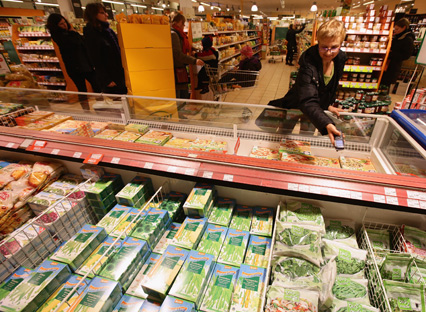Food prices fall – but effect of Brexit vote threatens to bite
Food prices fell by 1.1% in August, says BRC, in record-breaking deflation

A free daily email with the biggest news stories of the day – and the best features from TheWeek.com
You are now subscribed
Your newsletter sign-up was successful
The price of food plunged by a record amount in August but experts warn that the effect of the Brexit vote may soon be felt by consumers.
The price of food fell by 1.1 per cent in August, compared to a 0.8 per cent fall between June and July, according to the latest monthly index compiled by Nielsen and the British Retail Consortium (BRC).
August's figures show that this is the first time food deflation has been higher than one per cent, year on year, since the index was started in December 2006.
The Week
Escape your echo chamber. Get the facts behind the news, plus analysis from multiple perspectives.

Sign up for The Week's Free Newsletters
From our morning news briefing to a weekly Good News Newsletter, get the best of The Week delivered directly to your inbox.
From our morning news briefing to a weekly Good News Newsletter, get the best of The Week delivered directly to your inbox.
The index shows that prices in all types of shop fell by 2.0 per cent last month, compared to a 1.6 per cent fall between June and July, says Reuters.
According to the Daily Telegraph, food is dramatically cheaper because of a combination of soft oil prices, an oversupply of wheat and the continuing price war among British supermarkets.
Morrisons, the UK's fourth-biggest supermarket, reported a fresh round of price cuts today. It is reducing the price of its 'essential' range meat and poultry products by 12 per cent as it tries to fight the discounters, reports the Financial Times.
The supermarket is also reducing the price of 30 fruit and vegetable products. The chain says it has slashed prices on more than 4,435 products in the year to date, as part of its "price crunch" strategy.
A free daily email with the biggest news stories of the day – and the best features from TheWeek.com
But the BRC warns that the weakened pound, in the wake of the Brexit vote, is "likely to push up grocery prices in the coming months".
The BRC's Helen Dickinson says: "The devaluation of sterling will put upward pressure on shop prices. But that's likely to take several months to properly feed through [when] existing contracts with foreign suppliers come to an end.
"Lower prices than a year ago across most channels with further price-cuts by supermarkets has been good news for shoppers and helped to keep consumer spend buoyant over the summer.
"Competition for discretionary spend is likely to intensify as we head towards the end of the year, so retailers will be keen to keep prices low and promotions sharp."
-
 Are AI bots conspiring against us?
Are AI bots conspiring against us?Talking Point Moltbook, the AI social network where humans are banned, may be the tip of the iceberg
-
 5 calamitous cartoons about the Washington Post layoffs
5 calamitous cartoons about the Washington Post layoffsCartoons Artists take on a new chapter in journalism, democracy in darkness, and more
-
 Political cartoons for February 14
Political cartoons for February 14Cartoons Saturday's political cartoons include a Valentine's grift, Hillary on the hook, and more
-
 How corrupt is the UK?
How corrupt is the UK?The Explainer Decline in standards ‘risks becoming a defining feature of our political culture’ as Britain falls to lowest ever score on global index
-
 The high street: Britain’s next political battleground?
The high street: Britain’s next political battleground?In the Spotlight Mass closure of shops and influx of organised crime are fuelling voter anger, and offer an opening for Reform UK
-
 Biggest political break-ups and make-ups of 2025
Biggest political break-ups and make-ups of 2025The Explainer From Trump and Musk to the UK and the EU, Christmas wouldn’t be Christmas without a round-up of the year’s relationship drama
-
 ‘The menu’s other highlights smack of the surreal’
‘The menu’s other highlights smack of the surreal’Instant Opinion Opinion, comment and editorials of the day
-
 Is a Reform-Tory pact becoming more likely?
Is a Reform-Tory pact becoming more likely?Today’s Big Question Nigel Farage’s party is ahead in the polls but still falls well short of a Commons majority, while Conservatives are still losing MPs to Reform
-
 Taking the low road: why the SNP is still standing strong
Taking the low road: why the SNP is still standing strongTalking Point Party is on track for a fifth consecutive victory in May’s Holyrood election, despite controversies and plummeting support
-
 Is Britain turning into ‘Trump’s America’?
Is Britain turning into ‘Trump’s America’?Today’s Big Question Direction of UK politics reflects influence and funding from across the pond
-
 What difference will the 'historic' UK-Germany treaty make?
What difference will the 'historic' UK-Germany treaty make?Today's Big Question Europe's two biggest economies sign first treaty since WWII, underscoring 'triangle alliance' with France amid growing Russian threat and US distance